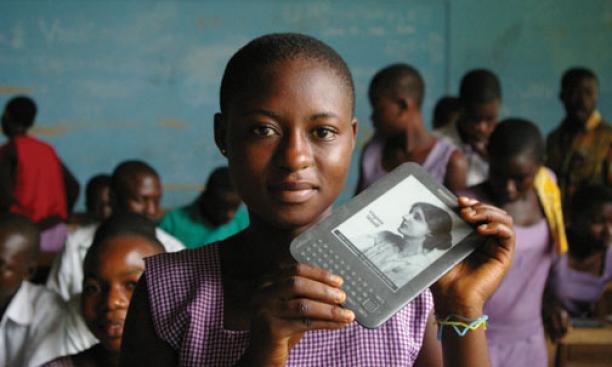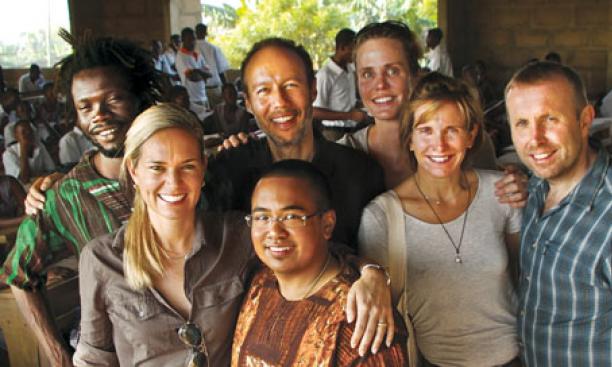

What if you gave preloaded e-readers to students in developing nations? What would be the impact on the children — and on publishers? Those are among the questions being explored by Worldreader.org, a nonprofit organization co-founded by David Risher ’87 that launched its first large-scale pilot program last winter by providing 470 Kindle e-readers loaded with textbooks, classic novels, and other books to six schools in a village in Ghana.
Worldreader’s mission is to expand reading and comprehension among students by bringing e-books into places where paper books are scarce and difficult to obtain. The plan is ambitious, but Risher is used to thinking outside the box.
Risher joined Microsoft in 1991, then moved to Amazon in 1997 to expand the year-old company beyond books, ultimately becoming a senior vice president and Jeff Bezos ’86’s right-hand man. Three years ago Risher stepped off the corporate track to teach business in an M.B.A. program, travel with his family, home-school his daughters, and brainstorm his next project.

The idea for Worldreader dawned on Risher while he was traveling in Ecuador in 2009 and saw a closed orphanage packed with books that nobody had access to. He realized he could provide students with greatly expanded access to books through e-books — if pricing and distribution issues could be settled. He co-founded Worldreader.org with Colin McElwee, previously the director of marketing at a business school in Barcelona, where Risher now lives.
Risher assembled a team that includes Susan Moody Prieto ’94 as director of communications and Barbara Hummel ’82 as director of development. He also worked his contacts at Amazon to purchase Kindles in bulk and get discounts on downloads. The team’s strategy combines a not-for-profit structure with market-based thinking. Worldreader is tracking the pilot’s impact on reading, and also encouraging a local business “ecosystem,” he says: Local publishers’ books are being digitized, giving them more visibility, and artisans are creating covers and accessories for the e-readers.
In the village in Ghana, Worldreader provided Kindles preloaded with 80 books and trained teachers to incorporate them into lesson plans. Wi-Fi is available in the village. Elementary, junior-high, and high school students can download at no charge other books that are donated by publishers such as Random House or are in the public domain. As of April, about 40,000 books had been downloaded.
“We’re thrilled to see kids reading so much, so fast,” says Risher. “E-books are the only way for kids to get their hands on books that inspire them.”
In a study, Worldreader is comparing the six schools that received the preloaded Kindles with three control schools without e-readers, and will look at the number of books read in each school and whether children do better in reading-comprehension tests. Early results show that children are using the e-readers to read more outside of class, share materials with their parents, and explore series that they like, such as The Magic Treehouse.
Worldreader donated the e-readers to Ghana, although there will be a subsidized charge for users in upcoming pilots. A second pilot was launched in Kenya in May.
A favorite memory for Risher involves a kickoff meeting at a church in Ghana, where 400 community members gathered to learn about the program. He recalls, “The church’s minister stood up and said, ‘This may be difficult to hear, but you should hear it. It’s said if you want to hide something from a black man in Africa, put it in a book, because he’ll never find it there. You are going to be the ones to change that.’”
Van Wallach ’80 is a freelance writer in Westport, Conn.
